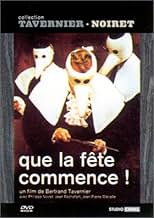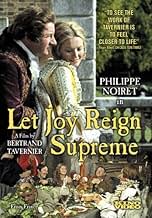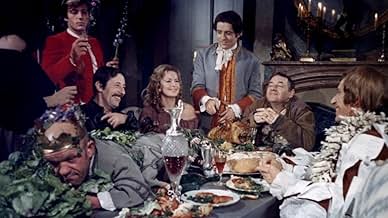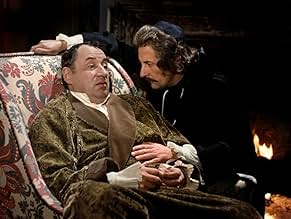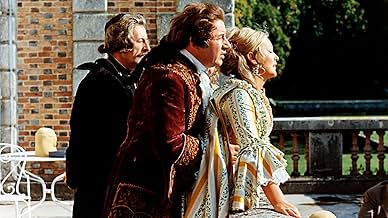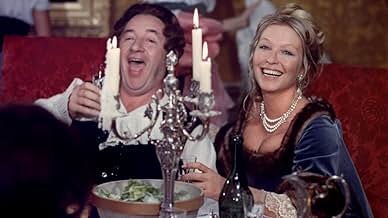IMDb रेटिंग
7.0/10
1.9 हज़ार
आपकी रेटिंग
अपनी भाषा में प्लॉट जोड़ेंA look at 18th-century France, when the authorities' depravity contribute to social oppression, and the uprisings flare up one after another.A look at 18th-century France, when the authorities' depravity contribute to social oppression, and the uprisings flare up one after another.A look at 18th-century France, when the authorities' depravity contribute to social oppression, and the uprisings flare up one after another.
- निर्देशक
- लेखक
- स्टार
- पुरस्कार
- 5 जीत और कुल 3 नामांकन
फ़ीचर्ड समीक्षाएं
This banquet, unlike one of foodstuffs, can be savored again and again to discover its parts. A political tale, a moral tale, an aesthetic breadth that rewards repeated viewing. The casual brutality of the palace: children playing darts against a painting; nobles and servants tossing around a dead rat; and, of course, the walking latrine! As above, so below: brutish soldiers, "shanghai-ers" for the colonies, provincial nobles who live in squalid houses barely above hovels. Noiret, Rochefort, Marielle so perfectly embody their characters; wise yet inconstant Orleans, conscienceless striver Dubois, impetuous, foolish yet gentlemanly Pontcallac. It would be rewarding to view this en suite with Etore Scola's brilliant "La Nuit de Varennes" to bracket the themes.
It is unbelievable how the director Tavernier could recapture the mentality of this beginning of the 18th century which would lead to the French revolution. The wars of Louis XIV had ruined the country and the best thing the regent (an excellent Philippe Noiret but all the actors are excellent) could do was to avoid war, so they spend their time with feasts, manipulation, fraud and speculation. The mentality of the Noble of France is well described. There is (among others) an interesting dialogue between the regent and his nephew about the way the comte de Horn should be executed: it had never happened before (in this way: rouer) in France, and he only killed a speculator!. All those pretty details and the funny but accurate dialogues make of -this movie an unique historical document and at the same time it is a pleasure to see the movie again and again.
This is one of my all time favorite movie and probably the best historical movie ever. One of the few movies featuring 3 of the best french actors (in leading roles): Philippe Noiret, Jean Richefort and Jean-Pierre Marielle. This movie is about how cynical France was ruled after the death of Louis XIV and while the new (Louis XV) was just a child. Don't expect a spectacular movie with great action and bloody violence (like Gladiator or Brave Heart). The pleasure with this movie is somewhere else: dialogs (brilliant), description of cynicism of the nobility and the actors performances (Jean Rochefort, playing L'Abbé Dubois, stoled the show).
If you think 2020 is a decadent historical period with dubious morality and opportunist, cynical leaders primarily concerned with satisfying their personal pleasures, then you should try to compare with the year 1719 as presented in the film 'Que la fête commence ...' made in 1975 by Bertrand Tavernier. The English title is 'Let Joy Reign Supreme'.
Louis XIV (the Sun King, 'the state is me', etc.) had died for several years. His great-grandson, the future Louis XV, being a child, the affairs of the state were run by his uncle, the regent Philippe II d'Orleans (played by Philippe Noiret). The rengent was a liberal who had introduced timid political reforms, but also a libertine, an amateur of ever-younger mistresses, procured by his chief adviser, abbot Dubois (Jean Rochefort), a thruster whose main aim was to reach the rank of bishop despite his modest origins. At the royal court and in the palaces of the nobility debauchery, greed and immorality were the norm, and only death, sometimes tragic, sometimes stupid, interrupted the series of parties. The rest of the country mirrored in other shades and colors the same political and moral decay - priesthood was concerned with the excommunication of rats, the small nobility with separatist plots, and the simple people caring for the bread of tomorrow. The story follows the Breton plot led by the picaresque Marquis de Pontcallec (Jean-Pierre Marielle) and the way the higher classes react (or ignore) the growing social fermenting. The seeds of the revolution had been thrown away, but the century was still young and 70 years would pass until the fall of the Bastille.
With this film Bertrand Tavernier approaches a popular and successful genre of French cinema of the 50s and 60s - the cape and sword films, but his heroes are far from being gallant musketeers. The director seems to have not yet mastered the fluidity of the cinematic narrative, very visible in his next films, or he may have been more concerned with the elements of historical satire, the glove-less portrayal of the villains of the time hidden behind their carnival masks, of sarcastic criticism of the decay that rages behind the luxurious decorations and beneath the tables of copious banquets. The historical reconstruction is frothy, with many moments of cynical and extreme humor. Today's viewers who appreciate French cinema and its actors are offered the opportunity to see Philippe Noiret in one of his many notable roles and with Jean Rochefort who camouflages his inborn nobility to embody the role of the Machiavellian abbot who sets in motion political intrigues. The acting revelation, however, is Jean-Pierre Marielle, a lesser-known actor, who builds a memorable character, a kind of late and disturbed Don Quixote, a victim of his own ambitions. The film has a modern look and the 45 years since its creation only contribute to amplifying its effect on the viewers. Paradoxically, or perhaps not, the historical comparison seems even more actual today than it was then.
Louis XIV (the Sun King, 'the state is me', etc.) had died for several years. His great-grandson, the future Louis XV, being a child, the affairs of the state were run by his uncle, the regent Philippe II d'Orleans (played by Philippe Noiret). The rengent was a liberal who had introduced timid political reforms, but also a libertine, an amateur of ever-younger mistresses, procured by his chief adviser, abbot Dubois (Jean Rochefort), a thruster whose main aim was to reach the rank of bishop despite his modest origins. At the royal court and in the palaces of the nobility debauchery, greed and immorality were the norm, and only death, sometimes tragic, sometimes stupid, interrupted the series of parties. The rest of the country mirrored in other shades and colors the same political and moral decay - priesthood was concerned with the excommunication of rats, the small nobility with separatist plots, and the simple people caring for the bread of tomorrow. The story follows the Breton plot led by the picaresque Marquis de Pontcallec (Jean-Pierre Marielle) and the way the higher classes react (or ignore) the growing social fermenting. The seeds of the revolution had been thrown away, but the century was still young and 70 years would pass until the fall of the Bastille.
With this film Bertrand Tavernier approaches a popular and successful genre of French cinema of the 50s and 60s - the cape and sword films, but his heroes are far from being gallant musketeers. The director seems to have not yet mastered the fluidity of the cinematic narrative, very visible in his next films, or he may have been more concerned with the elements of historical satire, the glove-less portrayal of the villains of the time hidden behind their carnival masks, of sarcastic criticism of the decay that rages behind the luxurious decorations and beneath the tables of copious banquets. The historical reconstruction is frothy, with many moments of cynical and extreme humor. Today's viewers who appreciate French cinema and its actors are offered the opportunity to see Philippe Noiret in one of his many notable roles and with Jean Rochefort who camouflages his inborn nobility to embody the role of the Machiavellian abbot who sets in motion political intrigues. The acting revelation, however, is Jean-Pierre Marielle, a lesser-known actor, who builds a memorable character, a kind of late and disturbed Don Quixote, a victim of his own ambitions. The film has a modern look and the 45 years since its creation only contribute to amplifying its effect on the viewers. Paradoxically, or perhaps not, the historical comparison seems even more actual today than it was then.
This majestic movie reveals everything of that contrasting period after the reign of the "Roi Soleil". France was empty-blooded by the wars and de best thing the Régent of that moment could was to make peace with England. A Breton upraising supported by Spain was the worst case scenario. L'abbé Dubois is eager to become archbishop and everything he does, even the national politics is supported by his dream. We see the speculations about Missisipi and the first bank notes by the state. The Régent, Philippe Noiret, is a person who enjoys life and tries to avoid all problems. Against this, l'abbé Dubois and the nephew of the Régent seem to be the human beasts fueled by their ambition. The church is all powerful and the High Nobility without scruples. The state tries to populate la Louisiane by embarking prostitutes. The Régent seem to be the only good person of his time. This movie is a joy to watch again because of the sharp dialogue and the historical details.
क्या आपको पता है
- ट्रिवियाAgnès Château's debut.
- कनेक्शनReferenced in Des Bronzés au Père Noël, la folle histoire du Splendid (2014)
- साउंडट्रैकGénérique: Forlane / Penthée Acte V)
Composed by Philippe d'Orléans
टॉप पसंद
रेटिंग देने के लिए साइन-इन करें और वैयक्तिकृत सुझावों के लिए वॉचलिस्ट करें
- How long is Let Joy Reign Supreme?Alexa द्वारा संचालित
विवरण
- चलने की अवधि
- 1 घं 59 मि(119 min)
- ध्वनि मिश्रण
- पक्ष अनुपात
- 1.85 : 1
इस पेज में योगदान दें
किसी बदलाव का सुझाव दें या अनुपलब्ध कॉन्टेंट जोड़ें

![Bande-annonce [OV]](https://m.media-amazon.com/images/M/MV5BYzg1NDE4N2EtN2FiMi00MmEwLTkwM2UtMDNkMDA5Y2ZmODE5XkEyXkFqcGdeQXRyYW5zY29kZS13b3JrZmxvdw@@._V1_QL75_UY281_CR0)
